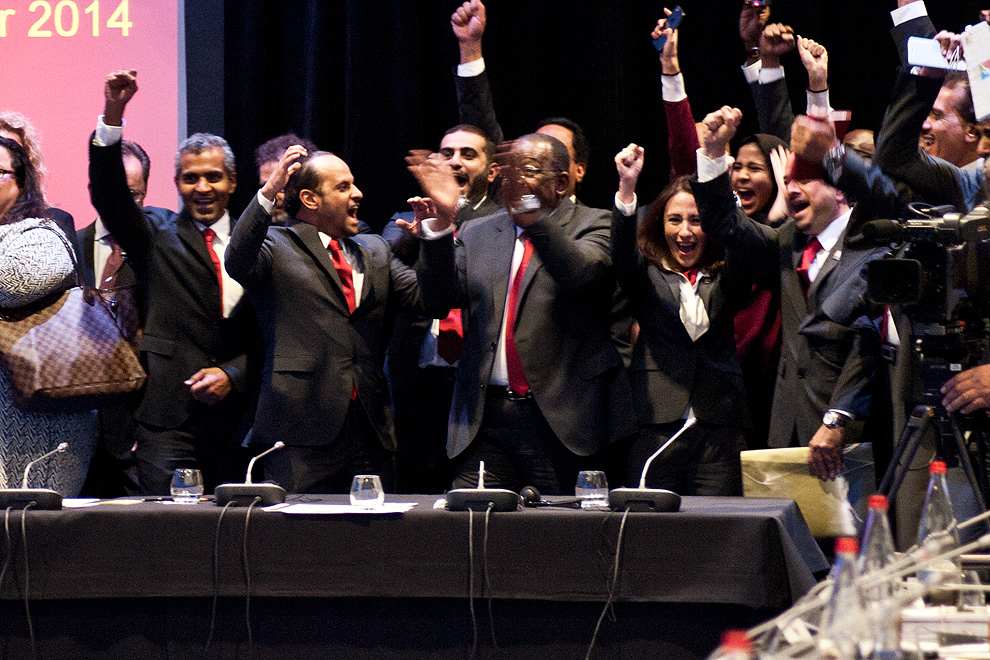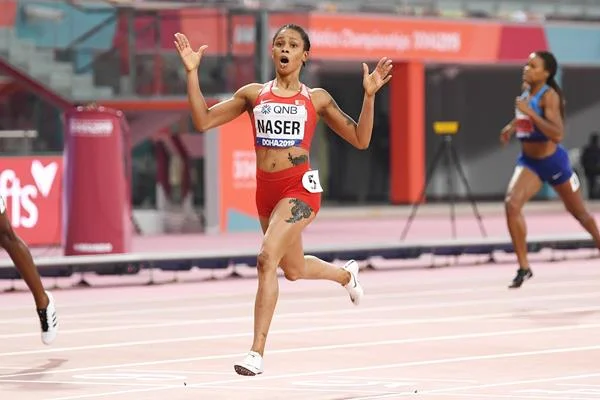MONACO — Qatar’s Mutaz Essa Barshim is just 23, a bronze medalist in the men's high jump at the London 2012 Olympics, silver medalist in the event at the 2013 world championships, gold medalist at the 2014 world indoor championships.
Speaking here Tuesday with real passion and soul to the 27 members of the ruling council of international track and field’s governing body, the IAAF, Barshim said, on behalf of Doha’s bid for the 2019 world championships, “Are you willing to expand the sport that we love?”
Doha had it all Tuesday: facilities, resource, ambition, the advantage of coming back humbled after losing to London for 2017. With Eugene, Oregon, pressing hard, plainly presenting for one and all the question that dared to be asked — was the IAAF willing to entertain the notion of going, finally, to the United States — Doha played the trump card.
Mutaz Essa Barshim.

The IAAF awarded its 2019 championships to Doha in a close vote, the Qatari capital winning over Eugene in a second round of voting, 15-12.
In a first round, Doha had gotten 12 votes, Eugene nine. The third city in the mix, Barcelona, got six votes and was eliminated.
It is entirely typical in bid contests, whether for the Olympic Games or otherwise, for bid cities to put celebrity athletes front and center to troll for votes. Usually, these athletes read from cue cards or look uncomfortable and the whole thing seems forced and weird.
When it works, however, it really works.
Three years ago, for instance, the Pyeongchang 2018 Winter Games bid committee relied on Toby Dawson, the U.S. skier who had been born in Korea, then adopted by an American family. His heartwarming story tugged at emotions as Pyeongchang rolled to a landslide victory.
On Tuesday, the U.S. sprinter Allyson Felix was — as always — elegant in advancing Eugene’s case. Giving of her time on her (29th) birthday, she said, “Putting your event in Eugene will launch a revolution of throwing, running and jumping in our country."

The Americans had made it abundantly clear that they saw the 2019 vote as a defining moment for the IAAF. If not now for track and field in the United States, when?
“Destiny is calling us,” bid leader Vin Lananna said. “America is waiting. Eugene is ready. Let’s tell our story together.”
From the American view, there was so much positive about this Eugene candidacy:
A re-done Hayward Field. The potential of packed stands, morning and night, a marked contrast to the worlds in 2013 (Moscow) and 2011 (Daegu, South Korea), which suffered from empty stadiums.
As the Americans told the council in the last question to be asked, a 2019 Eugene championships would be broadcast live on NBC. As Felix and others made abundantly plain, the worlds would re-energize the sport in the United States — the engine for much more to come in bigger cities.
What was left unsaid but nonetheless clearly understood, meantime, were other factors. Consider:
— Doha would put on the 2019 worlds from Sept. 28-Oct. 6. For contrast, the 2015 worlds will be Aug. 22 in Beijing, the 2017 edition Aug. 5-13 in London.
Doha 2019 would be just 10 months before the 2020 Summer Games in Tokyo. How would that affect athlete training?
That time frame, moreover, lines up in the middle of other peak broadcast seasons, including the NFL.
— This was the rare circumstance in which the U.S. could actually be seen as the developing market.
In his remarks to the council, Lananna said, “Really, what is the takeaway? The United States promises to you today to deliver an unbelievable world championships.”
The challenge for Eugene: Doha promised the same thing, albeit in so many words.
While the U.S. is still climbing back into the international bid game, Doha — and Qatar — are by now seasoned veterans.
Over the next year, Qatar will play host to 43 international sports events. It will stage world championships in swimming and team handball, among others. In 2018, it will put on the world gymnastics championships. Of course, in 2022 it gets the soccer World Cup.
Perhaps of most relevance to the IAAF, Doha bid three years ago for the 2017 worlds. London won, 16-10, amid a pledge from Sebastian Coe, the leader of the London 2012 Games, to keep track and field at Olympic Stadium after those Games.
“When you lose, you should be humble,” Sheik Saoud bin Abdulrahman al Thani, the Doha 2019 bid leader and general secretary of the Qatar Olympic Committee, said. “Not every game will you win.”
For 2019, the Qataris promised a 100-meter video board atop the stadium. Five-star accommodations. A night marathon along the Corniche.
The late September start, they said, means that futuristic air conditioning systems in the stadium won’t be needed — but they have it and, they declared, can get temperatures down in two hours.
A Be In TV executive, Yousef Al Obaidly, promised “the most comprehensive promotional package ever.”
There’s a new mega-airport in Doha. Qatar Airways rocks.
And on and on.
“Today,” Dahlan al Hamad, president of the Qatar Athletics Federation and an IAAF vice president told the council, “we have the choice to make a deep impact, in a place where our sport can really grow, with a partner that can help us to make it happen.”
To critics of Doha, Sheikh Saoud had this to say in an interview: “We tell them to come and witness for yourself. Come and see. A lot of people don’t have the financial power [that Qatar does]. Not a lot of people choose to use sport … for everything. We believe in sport.”
Last week, at a major Olympic meeting in Bangkok, the feeling was Eugene was looking at five -- maybe eight -- votes maximum, in the first round. It wasn’t clear whether the Oregon city would even make it through to the second round.
The Eugene presentation Tuesday was, in every way, first rate. That clearly helped.
But so, too, Doha.
And only one of the two had Mutaz Essa Barshim.

“We need you to be the spark,” he told the IAAF council.
“We need everybody’s help. We need to make an impact. We need to take athletics to a new place. I’m not the only one sharing this dream.”
He added for emphasis a moment later, “We need everybody to come together for the sport that we love.”
None of this was rehearsed. Barshim spoke without notes. He did not pause or need for an instant to collect himself. “No script,” he said.
“Almost I had tears,” Sheikh Saoud, who has seen it all, said later. “The way he spoke — he was not just a star athlete. He was a star of expression.
“Most council members,” the sheik reminded, “were athletes. They were in his shoes. They know how it is.”
“From the heart,” Barshim would say later.
It’s a lesson worth remembering. For all the resource, it always comes down to this: sport — even, perhaps especially, the bidding for the events at which high-level sport is contested — is about emotion, about human connection.
On this day in Monaco, Doha had it. See you in 2019 in Qatar.







